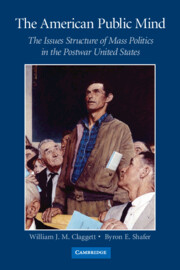7 - Voting Behavior
The New Issues
Published online by Cambridge University Press: 05 June 2012
Summary
The established issue domains for policy conflict in the postwar era, social welfare and international relations, could be viewed as hardy perennials – present across all of American history. The nation was born in international conflict by definition, and its early years made foreign policy crucial to national survival. The domain did wax and wane thereafter, with a long middle period of lesser emphasis. Yet as the postwar era opened, foreign policy had been dramatically reemphasized by World War II, as it would be again by the Cold War to follow. The very notion of a postwar era attested to the continued centrality of international relations to American politics.
By comparison, from the opening partisan split between Federalists and Democratic-Republicans in the new nation, economics and social welfare had been much more of a constant in policy conflict. Sometimes their embodiment was public works, sometimes taxation. Sometimes it was tariffs and trade, sometimes monetary policy. Sometimes the focus was economic growth, sometimes redistribution. And sometimes it was the desirability and composition of targeted programs of social welfare conceived as such. The point is just that one or another of these embodiments was almost always present. Moreover, as the postwar era opened, the domain was represented by the greatest welfare enhancement in all of American history, the New Deal.
Yet even the new issue domains for policy conflict in the postwar era, civil rights and cultural values, were hardly new in some absolute sense.
Information
- Type
- Chapter
- Information
- The American Public MindThe Issues Structure of Mass Politics in the Postwar United States, pp. 210 - 240Publisher: Cambridge University PressPrint publication year: 2010
